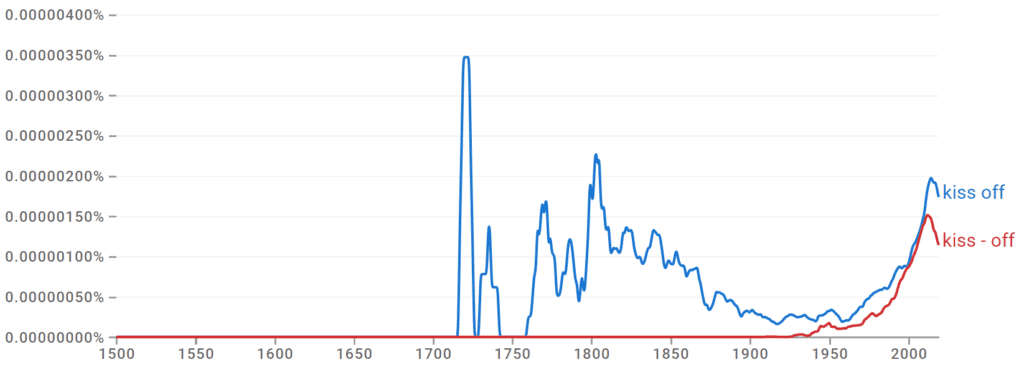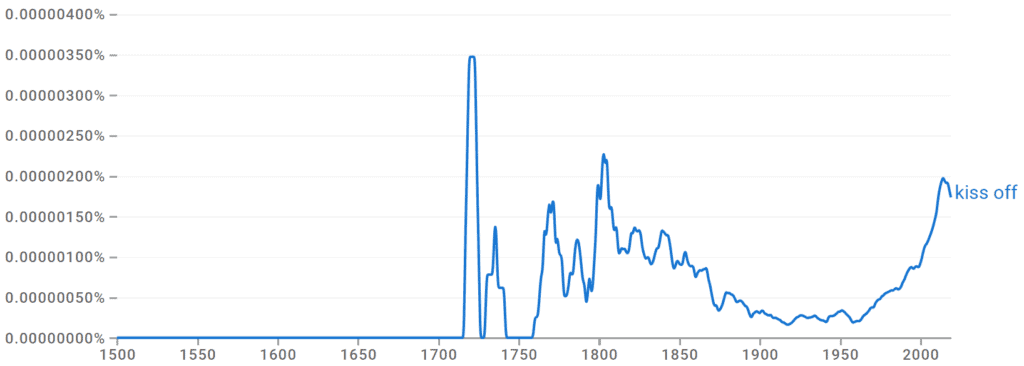Kiss off means to dismiss someone or something with disdain or indifference. A bit spicy, eh? It’s a phrase often used when someone wants to send a loud and clear message of rejection, so it’s a term that’s not to be used lightly. This idiom acts as the linguistic version of an eye roll or a door slam.
An idiom is a phrase or expression whose meaning cannot be understood from the ordinary meanings of its individual words. This idiom, like many others, layers our language with nuances and emotion. Stick around as I break down its meaning, origin, and correct usage so you’ll know when and how to drop this verbal mic.

Should the Term ‘Kiss Off’ Be Hyphenated?

Technically, no. Kiss off can be a noun or a verb and is usually written as two separate words, although you might sometimes see it hyphenated for emphasis or in creative writing. It’s sometimes hyphenated in the U.K., but the standard usage doesn’t ask for a hyphen.
A Deeper Look at the Kiss Off Meaning
Kiss off is a blunt way to express that someone or something is being dismissed or rejected. It’s a statement of finality and is used when someone’s reached their limit with a situation or individual and is cutting ties or taking definitive action.
Different Tenses to Use
- Present Tense: Kiss Off (He says to her, “You can kiss off.”)
- Past Tense: Kissed Off (He kissed off the opportunity.)
- Past Participle: Kissed Off (She had kissed off her chances at promotion.)
Origin and Etymology of Kiss Off

While there are no actual pinpointed origins, the term definitely comes from American slang. It was a common saying in the 1700s, but in a more literal sense, where people would kiss their loved ones goodbye to send them off. But it rose to prominence as an idiom during the 1930s and is often heard in movies and television shows depicting tense situations or confrontations.
Kiss Off Synonyms
- Disregard
- Snub
- Reject
- Dismiss
- Brush off
‘Kiss Off’ Examples in a Sentence

- Adam, if you don’t take this job seriously, you can kiss off any future promotions.
- She kissed off her ex-boyfriend with a dismissive, “Thank you, next.”
- I hate how James is so arrogant; he just kissed off everyone’s advice after asking for it.
- “You’ve had your chance; now kiss off,” she snapped at the guy who’s turned her down.
- Together, they kissed off the old plan and started with a new plan to build their house.
- “If you’re not interested, you can just kiss off and stop wasting my time,” she told him with finality.
- She’d kissed off any chance of redemption after everyone found out what she really did.
- “Kiss off if you think I’m going to wait for pizza any longer,” he told her.
Kiss Off and Read About More Idioms
The phrase kiss off is a striking idiom for those tense moments when you’ve had enough and you’re ready for things to end. If you use it with care, it can convey your sentiment as effectively as a real slap. For more on idioms that spice up your vocab, have a peek at my archive of other guides.
